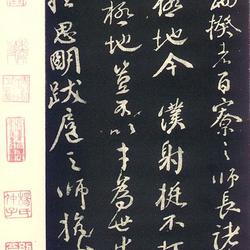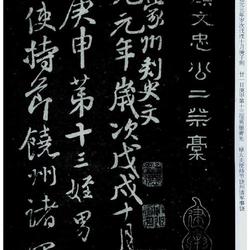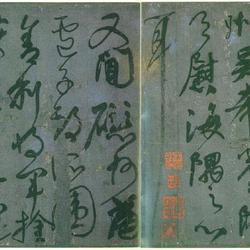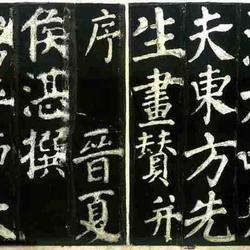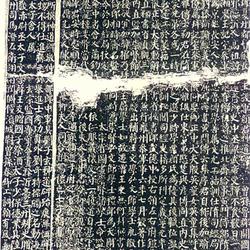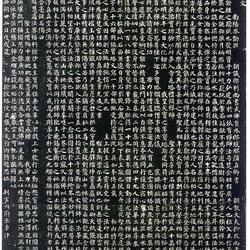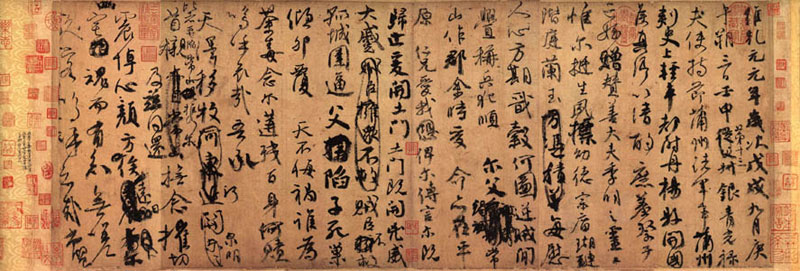
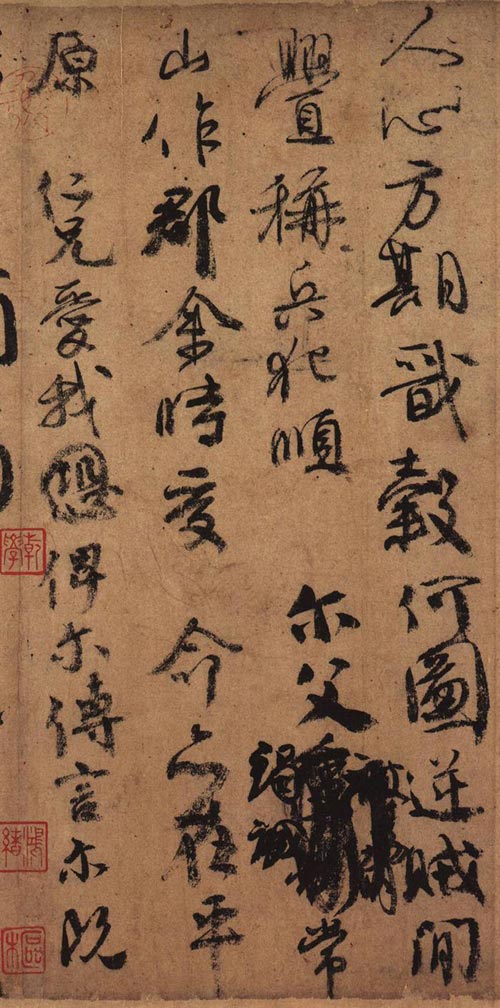
Yan Zhenqing's "Manuscript of Memorials to Nephew", cursive, length 28.2 cm, width 72.3 cm, collected by the National Palace Museum, Taipei
Explanation:
The first year of Wei Qianyuan. The year of the Reform Movement of 1898. September. Geng Wushuo. Renshen on the third day. Thirteenth (removed from the father). Uncle Yin Qingguanglu's husband entrusted Chijie to the military in Puzhou. Puzhou governor. Get on the light chariot Captain. Zhenqing, the founding lord of Danyang County. To clear up the common people's shame. As a sacrifice to my deceased nephew, I gave him the spirit of Ji Ming, a great doctor who praised the good deeds. But you are still alive. Subiao Youde. Ancestral temple Hulian. Orchid jade in the courtyard. (It can be wiped away based on accumulated good deeds). Every comfort. Fangqi Jiangu. Why would you want to start a fight with a traitor? Calling a soldier a violation of obedience. My father is sincere. (□ Make it, remove it, change it and remove it again). Changshan is the county. Yu Shi was ordered. Also in the plains. Dude loves me. (I fear it will be painted over). Bier rumors. You have come home. Open the earth gate. The gate is open. A fierce frown. (The thieves and ministers support the crowd and refuse to save Tu and go away). The thieves and ministers will not (support Tu to) save him. The isolated city was besieged. Father (capture Tu to go). Trap to death. The nest falls over. God does not regret misfortune. Who is poisoning? I miss you so much. How can one redeem one's body? So sad. I inherit Tianze. Move to Muhe Pass. (Go to Hedong near Tu). The spring is bright (your painting is gone). Fall into Changshan again. (Put it away). Take your head with you. Thank you for your return. (Also removed from Changshan Tu). Caressing and caressing destroys everything. Heartbroken. The sun is far away. (The two characters are painted out and cannot be distinguished). Bu (the word is painted out again and becomes indecipherable). Your secluded house. (stroking away). Soul and knowledge. No long-term guest. Alas, Shang Xiang.
The original text is now annotated as follows:
Original text: The first year of Wei Qianyuan, the year of Wuxu.
Note: "Wei": a auxiliary word, often used at the beginning of a sentence and sometimes in the middle. "Qianyuan": It is the reign name of Emperor Suzong Li Heng of the Tang Dynasty, the "first year", equivalent to 758 AD. "Sui Ci Wuxu": Sui Ci is also called Nian Ci. In ancient times, the year was marked by the year star (Jupiter). The ancients divided the equatorial part of the sky into 12 equal parts, each divided by certain stars. Jupiter moves exactly one quarter every year, one week every 12 years. The number of years the year star (Jupiter) is worth and its stems and branches are called years. The stem and branch of this year are Wuxu.
Translation: It was in the first year of Qianyuan of Emperor Suzong of the Tang Dynasty (758 AD), and the lunar calendar was the year of Wuxu.
Original text: Gengwu in September, Renshen on the third day of the lunar month.
Note: The ancients not only used the stems and branches to mark the year, but also used the stems and branches to mark the months and days. The lunar calendar starts from Bingyin, with a cycle of 60 months (five years). The calendar also uses Jiazi as the first day and 60 days as a cycle. "Suo": When the moon moves between the earth and the sun, it is called "Suo" when the moon cannot be seen from the ground. Generally, the first day of the lunar calendar is called "Suo", and the fifteenth day of the lunar month is called "Suo". Youshuo also has the meanings of beginning and beginning. This can be interpreted as the third day of the lunar month.
Translation: The ninth month of the lunar calendar is Gengwu, and the third day is Renshen.
Original text: Thirteenth uncle, Yinqing Guanglu (elderly) husband.
Note: Yan Zhenqing has ten brothers and sisters in total, Zhenqing ranks seventh. But there are fifteen brothers with the same ancestor, and he ranks thirteenth. "Yinqing": refers to the silver seal and cyan ribbon. During the Qin and Han Dynasties, all officials with a rank of more than two thousand stones could wear a green ribbon with a silver seal. "Guanglu Doctor": formerly an official subordinate to Lang Zhongling. After Emperor Wu of the Han Dynasty, he had no fixed duties and was a loose palace, equivalent to an advisor. In the Tang and Song Dynasties, those who received the silver medal and green ribbon from the Guanglu doctor were the third-grade civil servants. The omission of the character "大" in the original post of "Dr. Guanglu" was a clerical error.
Translation: (Yan Jiming's) Thirteenth Uncle, Doctor Guanglu who wears a silver seal and a green ribbon.
Original text: Envoy Chijie, Puwai Military Affairs, and Puzhou Governor.
Note: "Shichijie": an additional title for the governor. With this title, he has the power to kill officials below the middle level. "Shizhijie" is the highest level among Zhijie, followed by "Zhijie", and the third level is "Fake Festival". "Provincial Governor": During the Sui and Tang Dynasties, the Provincial Governor was the chief executive of a state. The governor's book covers both military and civilian affairs. However, after the Han Dynasty, the power of military management was actually abolished. Therefore, in the Tang Dynasty, the military management was added to the street. After Yan Zhenqing was appointed as the governor of Bozhou, he was given the title of California Defense Envoy to show that he was also in charge of all military affairs. Therefore, the full name of the governor of his state is "Envoy Chijie, Puzhou Zhujun, Puzhou Governor". The situation of governors in other states is roughly the same.
Translation: The governor of Puzhou who envoys Chijie and various military forces in Puzhou.
Original text: Captain of Shangqingche and the founding lord of Danyang County, Zhenqing.
Note: "Qingche Duwei" was originally the title of a special military general in the Han Dynasty. In the Tang and Song Dynasties, he was an honorary official. There are twelve turns from Shangzhu Kingdom to Wuqiwei, and the eighth turn is "Shangqingqiduwei". Seventh, he became the captain of light vehicles. Under the captain of the light chariot are captains of cavalry and others. "Founding Marquis" is the title. In the Tang Dynasty, the titles were divided into nine levels, and the "Founding County Marquis" was the sixth level. The name of the county is often given in front of the hou, but the food is not necessarily provided by the county. Yan Zhenqing's title of Founding Marquis of Danyang County was also given to him when he took office in Puzhou.
Translation: Yan Zhenqing was rashly awarded the title of Commander-in-Chief and was promoted to the founding marquis of Danyang County.
Original text: In order to clear up the humiliation of the common people and give it to Ji Ming, a good doctor, after his death, he gave it to him.
Note: "Please drink, Shushan": "Zhuo" refers to wine, and also refers to pouring wine. "Please drink," refers to meager and cheap wine. "Shame" refers to food. "Shusha" refers to ordinary food. "Praise to the good doctor" : Doctor, in ancient times, there were three levels of ministers, officials and scholars under the king. After the Sui and Tang Dynasties, the doctor was regarded as the
The title of senior official. "Praise" is a word of praise. Yan Jiming was the third son of Yan Gaoqing. He served as the liaison between his father and Yan Zhenqing, and was later killed by An Lu. See the previous description. In the first year of Qianyuan, he was posthumously awarded the title of Doctor of Praise for Goodness by the imperial court.
Translation: Now we are offering light wine and homemade food to the deceased of the nephew of Dr. Yan Jiming. The word says:
Original text: You are still alive and have a long-lasting virtue. The hulian in the ancestral temple and the orchid in the courtyard comfort people's hearts.
Note: "WEI": a particle, used at the beginning of a sentence. "Ting": outstanding, outstanding. "Ancestral Temple Hulian": The sacrificial vessel containing millet in the ancestral temple was called Hu in the Xia Dynasty and Lian in the Yin Dynasty. This means that Yan Jiming has become an important role in the Yan family temple. "Jieting Orchid": Zhilan (fragrant
Grass) Yushu (immortal tree) is a metaphor for people's outstanding children. "Shishuo Xinyu·Yu" records: Xie An asked his nephews: "How can my children predict people's affairs and want to make them good?"
Translation: Only you (Ji Ming) were born outstanding and have always shown virtues that are rare for young people. You are like an important vessel in my ancestral temple, and like the herbs and fairy trees growing in our courtyard, you often make us feel very happy.
Original text: Fang Qiu is in the valley, and the rebels in the river map are provoking leisurely, claiming that the soldiers are in violation of the obedience.
Note: "Jiangu" refers to fortune and wealth. Jian means blessing. Gu is the general term for grain. In ancient times, official salaries were calculated in terms of grains, so the official salary could be replaced by "leisure" and the same period. "Calling to violate obedience": To violate obedience with rebellion, refers to raising troops to cause chaos.
Translation: I was hoping that (Ji Ming) would be happy and be a good official, but the traitor (An Lushan) took the opportunity to provoke and rebel.
Original text: My father is sincere and Changshan is the county. The rest of the time I was ordered to stay in the plains.
Translation: Your father (Yan Gaoqing) worked hard and served as the governor of Changshan. I (Yan Zhenqing) accepted the imperial appointment at that time and also served as the prefect of Pingyuandu.
Original text: My dear friend, you love me. It is rumored by Beer that when you return home, your love will open the earth gate. Once the earth gate is opened, it will be fierce and powerful.
Note: "Bi": to envoy. "Gui Zhi"; Zhi, particle. "Poetry. Qi Feng·Nanshan": "It is both returning and stopping. It is also pregnant with stopping." "Yuan Qiantumen": love, nai, then. Tumen, now Jingjing, Hebei Province, was a strategic location at that time. "Lame": push, force. Embarrassed.
Translation: My dear friend (Gaoqing), out of love for me, asked you to send me a message (that is, to act as a liaison). Since you have returned to Changshan, Tumen has been recaptured. After the Tumen was opened , the prestige of Ji Ni (An Lushan) was greatly frustrated.
Original text: The thieves and ministers do not save them, but they are surrounded by the isolated city. The father is trapped and the son dies, and the nest falls and the eggs return.
Note: "Thieves and ministers will not be saved": As mentioned above. It is said that after Yan Gaoqing regained Tumen, he sent Quanming to Chang'an to announce the good news and ask for reinforcements, but was kidnapped by Taiyuan King Yin Chengsheng and refused to rescue him. Three sentences of "Isolated city besieged": Refers to An Lushan returning to Changshan, Yan Gaoqing was isolated and helpless, and finally the city was defeated and captured.
captured. Yan Jiming, the Yan family, and Yan Gaoqing were killed one after another. This leads to the tragic ending of "when the eggs are re-nested, An's eggs are intact".
Translation: The traitor minister (Wang Chengye) supported the troops and refused to save him, causing the isolated city (Changshan) to be besieged. The trap's father (Yan Gaoqing) and son (Yan Jiming and family members, etc.) were killed successively. It's like a bird's nest being knocked down from a tree. Bird eggs will naturally be broken into pieces, but there will still be intact eggs there!
Original text: The world regrets its misfortune, who is responsible for the poison! I think you are disabled, how can you redeem your body? Alas!
Note: "Tu poison": Tu refers to bitter herbs, poison and poisonous insects. Note: These two sentences seem to be a metaphor for the success or failure of the imperial court and improper employment of personnel. "Escape"; encounter. " Alas": an interjection for the deceased. Wuhu means sighing. Mourning: grief. Zai: A particle that expresses exclamation. I first saw "Zuo Zhuan. The Sixteenth Year of Ai Gong". Confucius died.
Translation: Oh my God! Faced with such a tragedy, don't you feel regretful! Who caused this disaster? Thinking of you (Ji Ming) suffering such cruelty (only the head was left after being killed, and the body was lost) . How can a hundred bodies redeem your true body? Alas!
Original text: I inherited Tianze and moved to Muhe Pass. If the spring is brighter than before, I will fall into Changshan again, and I will return with you and your spear.
Note: "Heguan": river and pass. This refers to Puzhou, when Yan Zhenqing was transferred to Puzhou governor. He said in "Xie Shangbiao, the Governor of Puzhou": "The land of this state was the capital of Yao and Shun . The mountains and rivers outside and inside were called natural dangers in ancient times." It can be seen that this place has been an important pass since ancient times. "Bi"; close. "榇": originally refers to the sycamore tree, which is mostly used to make coffins. Here it refers to the coffin. Shouchun: refers to the coffin containing Ji Ming's head. "Hereby": this. The word "trap" in the original text was written incorrectly, and should be the word "zhi".
Translation: I accepted the favor of the Lord and was sent to Heguan (Puzhou) as a shepherd. Dear relatives, Quanming, go to Changshan again, take the coffin containing your head, and come back together.
Original text: I miss you so much that I am deeply moved!
Translation: The feelings of care and longing are overwhelming, and the huge grief makes the heart tremble and the face changes color.
Original text: Fangqi is far away from the sun, and Bu'er's house is quiet. The soul has knowledge, and it is a long-term guest without complaining.
Note: "Secret House": a residence in the underworld. Refers to the grave.
Translation: Please wait for a distant day and choose a good cemetery. If your soul has knowledge, please don't complain about being a guest here for a long time.
Original text: Alas! Shangxiao.
Note: "Shang Xi"; Xi, Tongxi. It also refers to entertaining with wine and food. This refers to the hope that the deceased can enjoy these sacrifices during sacrifices.
Translation: Alas! Please enjoy these offerings! Also known as "Manuscript of Memorial to Nephew Jiming", it was written when Yan Zhenqing was 50 years old. Total 25 lines, 230 words in total.
This manuscript traces the story of Yan Gaoqing, the governor of Changshan, and his son's family, who stood up and resisted resolutely during the rebellion in Anlu Mountain. As a result, "the father was trapped and the son died, and the nest overturned the eggs." Ji Ming is the third son of Gaoqing and the nephew of Zhenqing. When his father and Zhenqing jointly fought against the Anlu Mountain rebellion, he traveled between Changshan and Pingyuan to deliver messages to connect the two counties and jointly serve the royal family. Later, Changshan County fell and Ji Ming was killed. Only his head was left when he was buried. When Yan Zhenqing assisted in writing the essay, he was filled with grief and anger. He couldn't help himself and finished the manuscript in one go.
"Manuscript of Nephew Memorial" has three major features:
1. The round and powerful seal writing technique. That is, the round pen center is mainly used, and the hidden front comes out. The thick parts of this manuscript are simple and solemn, like a yellow bell and a big plume; the fine parts are condensed with muscles and bones, like the golden wind and autumn eagles; at the turning points, complexity may be reduced to simplicity, beautiful and natural, or the strokes may be severe and abrupt, and the continuity may be like a sudden stop . The writing is round and full of meaning, dripping with joy, like a river flowing down thousands of miles.
2. Open a natural structure. This manuscript changes from the lush, slender, graceful and charming style of "Two Kings" to a broad, natural and sparse structure, with stippling extending outwards, arcs facing each other, and echoing, scattered in form but convergent in spirit. The flow of energy between the characters changes according to the mood, regardless of clumsiness and unintentional intention. Punctuation and deletions can be seen everywhere. In the undressed writing, it is vivid and changeable. You can strongly feel the ups and downs of the strong and upright Yan Zhenqing's emotions. The strokes are sometimes slow and sometimes fast, sometimes slow and sometimes slow, and then stop again when trying to move. The characters are connected up and down, as if they are broken and connected, some are skillful, or the breaks are heavy; some are thin tendons, or are laid straight down, which can be said to be full of ups and downs and full of curiosity. The gathering place is not crowded, and the sparse place is not empty. It can be said that it is sparse and airtight, and it is full of the meaning of "scheming white things when they are black". Between the rows, there are conflicts from left to right, and the right and wrong are mutually reinforcing. They may be knotted and stuck together, or they may be cut off abruptly, allowing the true nature to express itself. What is particularly exciting are the last few lines, which change from rows to grass, rapid and unrestrained, and cascading down, with the majestic momentum of a river bursting its banks. In the eighteenth line, "Alas!", the first three words come out in succession, indicating that the grief has reached its extreme. From line 19 to the end of the chapter, it seems as if a storm has arisen again, with anger that is hard to suppress and feelings that are hard to express. When I wrote the word "Shou Chong", I wrote and rewritten it, left and right, and rewritten it again, as if I was in a whirlwind of emotions. The long song should be about crying, weeping blood and mourning, until the last line "Oh, woe is still good", which is shocking and soul-shaking.
3. Thirst and vivid ink technique. There are many pens in this manuscript, and the ink color is thick and dry. This is related to the tools Yan Zhenqing used when writing (short and bald hard or double-point pen, thick ink, and hemp paper). The artistic effect of this ink method is in perfect harmony with Yan Zhenqing's heart-rending sadness at that time. In the original calligraphy of this calligraphy, all the places where the writing strokes and the pulling points are clearly visible, which allows people to see the process of writing and the wonderful changes of the strokes, which is of great benefit to learning cursive writing.
This work was not originally written as a calligraphy work. Due to the extreme sadness and anger, it was difficult to calm down. There were more mistakes and smears. However, because of this, the calligraphy was solemn and solemn but also full of energy. , the writing style is round and majestic, and the posture is full of energy. It is written purely with the spirit of God and captures the beauty of nature. The whole story is full of ups and downs, sometimes it is depressed and painful, and bursts into tears; sometimes it is suppressed and suppressed, and it is heart-wrenching. It can be called a touching work of grief and indignation. Zhang Jingyan of the Yuan Dynasty wrote an inscription and postscript saying: "I think that an announcement is not as good as a letter, and a letter is not as good as drafting. The announcement is an official work, although it is in regular regular script, but it is ultimately a rope agreement; the letter comes from the whim of the moment, so it can be indulged; and the drafting comes from Unintentionally, he forgot both his palms and his palms, which is really wonderful." Yushu, Xian of the Yuan Dynasty, said in "Book Postscript": "The Manuscript of Sacrifice to My Nephew Jiming written by Lu Gong Yan Zhenqing, the great master of the Tang Dynasty, is the second best running script in the world." Recognized by calligraphers. The original remains are now in the National Palace Museum in Taiwan.
Collection reviews of past dynasties
"Guangchuan Book Postscript" Dong Kui, Song Dynasty
A corner is lifted up, and half of the stock is hidden. This is the style of calligraphy. As for the divisions, such as holding up the back, containing the eyes, using side reflections, and attaching music to the subject, then it is written into a book, and some people have done it all here. Lu Gong wrote in the book, his excellence is that he has preserved the laws and held them dignifiedly, and he is expected to be a virtuous gentleman. When I asked Huai Su why the broken hairpin was like a leaking house, he said that the old thief was gone. The predecessors were also reserved in their hiding places and did not tell others. They created subtle things and then found them. These two bodies are in the eight dharma and six bodies, and they are a branch of knowledge, and their dharma is so important. This is also the case for public sacrifices to brothers and sons.
"Postscript" Song Dynasty Chen Shen
Gong calligraphy and painting are majestic and beautiful, and they have become a family of their own since the Wei and Jin Dynasties. Seniors say that calligraphy is so perfect. The vertical strokes are grand and bold, flowing thousands of miles at a time, with energy mixed with fluidity. Whether it is a seal or an engraving, the wonderful solution is almost a creation of heaven. Isn't it right that the public notes the thought as a text, but in calligraphy and painting, there is no intention to work, but it is extremely laborious. Su Wenzhong said: "Jiangong and Dingxiang's five books are written in cursive paper, which is more unique than the other books by Gong." Nobufu. For example, if the public is loyal and virtuous, he will write bad books for thousands of years. He will be loved and cherished for thousands of years. If this is the case, he will be treasured.
"Postscript" Yuan Dynasty Zhang Yan
A letter is worse than a letter. Writing a letter is worse than drafting it. Gai Yisuo is an official work. Although Duankai is ultimately a rope agreement. Letters written out of temporary whims can be quite indulgent. And the drafting was done unintentionally, and it was because of forgetfulness. What a wonderful thing to see here. Looking at this post, it is true that the three methods of practicing and curing are combined. The former Song Dynasty was famous at that time.
"Postscript" Xian Yushu, Yuan Dynasty
Yan Zhenqing, the Grand Master of the Tang Dynasty, wrote the "Manuscript of Sacrifice to Nephew Jiming", which ranked second in the world in running script. The Yu family ranks first in Dharma books.
"Postscript" Yuan Dynasty Chen Yizeng
The first twelve lines are very euphemistic. At the end of the line, the word "Xun Er Ji Shi" turns right, to the word "yan", turns left, and then goes up to the word "fear", and "you" surrounds the word "I", and goes left to the line. If there are cracks at the end, it is suitable to sew with the paper. Since "you arrived at the lake" more than five elements, I was very angry, and the real house was leaking, and it was changed since "moving to the pasture". The five elements from "Wucheng" to "Shangxiao" are deep and bone-cutting, innocent and brilliant, which makes people's hearts move and shock. It is indescribably wonderful. Although it is different from the sorrow and music of "Yan Xu Gao", it is the same. The word "Cheng" sweeps across the plate, and the word "嗟" appears on the upper part of the left foot. The word "旟" is like Mount Tai pressing down on the bottom pillar. The word "哉" at the end is like the rolling sun of light clouds. The word frown is like a startled dragon entering its hibernation, and it is divine.
"Postscript" Ming Wen Zhengming
Yuan Zhang is uniquely called "Zi Tie", which is often seen in the cover, but "Sacrifice to Nephew" has never been heard of. Today's "Bao Zhang Lu" can be tested, so it is appropriate to call it "Zi Tie" together, but not as good as this. The world's commentaries on Yan's calligraphy only focus on the strength of his regular script, while Mi's unique cursive writing is the most dramatic. The valley is also cloudy, majestic and beautiful, and there are people who have been famous since the Wei, Jin, Sui and Tang Dynasties. Looking back at the generations of Ou, Yu, Chu, and Xue, they are all embarrassed by the law. How can it be like Lu Gong Xiaoran who came out of Shengmo to join them? Zai. Gai also takes the beauty of his running script. Moreover, these two posts are all temporary and have no intention, so they are innocent and outside the ordinary borders. Mi's so-called loyalty, anger, frustration and humiliation are not what he means in words.
"The Elegant Words of Calligraphy" by Xiang Mu of the Ming Dynasty. The cursive writing is like "Struggle for Seat" and "Memorial Notes for Nephew". It is also comfortable and strong, rich and dynamic, with a little grace at the top and a chasing Bo Shi at the bottom.
"Postscript" Wang Xuling, Qing Dynasty
Lu Gong's loyalty shines through the sun and the moon. Calligraphy crowned by Tang Xian. A piece of paper with just one word is a treasure passed down from generation to generation. Kuang Jiwen was especially inspired by loyalty and indignation. When it comes to the stagnation of human nature, it is not just the writing that is so black and wonderful that it can inspire people throughout the ages.
"Essays on Calligraphy at Chuyuelou" by Wu Dexuan, Qing Dynasty
Shen Bo said that Pingyuan's "Memorial to My Nephew" is better than "The Seat Calligraphy", and his argument is also reasonable. Those who have already lamented.
Short Commentary on "Manuscripts for Nephew Sacrifice" by Guo Zixu
In calligraphy creation, lyricism is the first difficulty. The eternal value of "The Manuscript of Memorial to My Nephew" lies in its frankness and sincerity. It is a model of using sincere emotions to drive the pen and ink, and under passion, regardless of clumsiness, and free to create as one pleases. The distinctive personality and unique form are the first of its kind in history. They are typical examples of calligraphy creations that describe aspirations, feelings, and expressions. They reflect the bold and forward-looking spiritual character and the unparalleled courage and mind of an artist. The emotional intensity contained in the works so powerfully shocks the hearts of every viewer that they have no time to take into account the superficial effects of the formal composition. This is the typical structure of natural beauty.
Emotion is an art trick that everyone knows, and calligraphy creation is especially about true emotion and deep thinking. The wonderful pen that shakes the reader's heart must be based on true feelings, and the state of high spirit and far-reaching charm must be achieved through deep thinking. The so-called creation of artistic value means that the general form contains independent existence that cannot be contained by ordinary structures. It is both a physical existence and a personal existence. Reflected in calligraphy creation, it is often a one- time acquisition that cannot be replaced by other things. "The Manuscript of Sacrifice to My Nephew" is exactly such a work. It is the only form of existence under the control of special emotions. What plays a decisive role here is sincere feelings and passionate emotions. It is like a bolt of lightning that cuts through the night sky, fleeting and irretrievable.
In human affairs, only true feelings can move people, especially literature and art. In the Roman era, Longanas also emphasized this point when he proposed the five sources of sublime style in his classic literary and artistic theory "On the Sublime". He said : "The first and most important is the solemn and great thought, and the second is the solemn and great thought. The second is strong and exciting emotions." He also said: "The important role of passion in creation and style is enough to make the entire structure magnificent."
Calligraphy creation is based on emotion and is driven by the mind. The vivid images and profound meanings in the works are the result of integrating emotion into the calligraphy. It cannot be caused" (Liu Yongji's "Ci Lun"). Only with extreme emotion , talent, and extreme thinking can "love be expressed freely and things be revealed." Especially those who touch the emotions of things and arise unconsciously can create vivid, touching, novel and wonderful works. Therefore, the most excellent works must be based on deep feelings. Although the pen is simple, it is thoughtful and artistic, and the appearance may be ugly, but the emotion is true. The degree of touching is determined by the intensity of emotion contained in the work.
"Manuscript of Memorial to My Nephew" is a masterpiece poured out of sincere emotions, a sonata of the soul, a voice of great sorrow and anger, and an immortal masterpiece condensed with blood and tears. The unconscious expression technique in the state of " forgetfulness" makes the works produce extremely beautiful artistic effects. "The drunkard's intention is not in wine", "Xiang Zhuang's sword dance is in Pei Gong", he is not writing, but describing the grief and indignation in his heart. He is not engaging in artistic creation, but talking to himself affectionately, The words were finished, the work was finished, and a masterpiece that no one, including himself, could ever repeat was produced. This is the secret to successful creation, and it is also an example of a breakthrough that occurred in an extraordinary moment after a long period of exploration.
The quality of its lines is strong and comfortable, blending seamlessly with the heart-wrenching thoughts and feelings, which is particularly commendable. This is the most difficult technique in calligraphy. In the history of Chinese calligraphy, only this work is the most powerful and smooth. The so-called "dry autumn breeze moistens the spring breeze", only this work can match it. Xian Yushu of the Yuan Dynasty commented on this as the second running script in the world. "The best running script in the world" has been taken first by Wang Xizhi's "Lanting Preface", so this work had to take second place. In fact, "The Manuscript of Sacrifice to My Nephew" should be the best running script in the world. " is an example of helpless method, direct expression of the heart, and incomparable real natural beauty. Although "Lanting Preface" is also supremely beautiful, after all, it is more artificial beauty than natural beauty.

